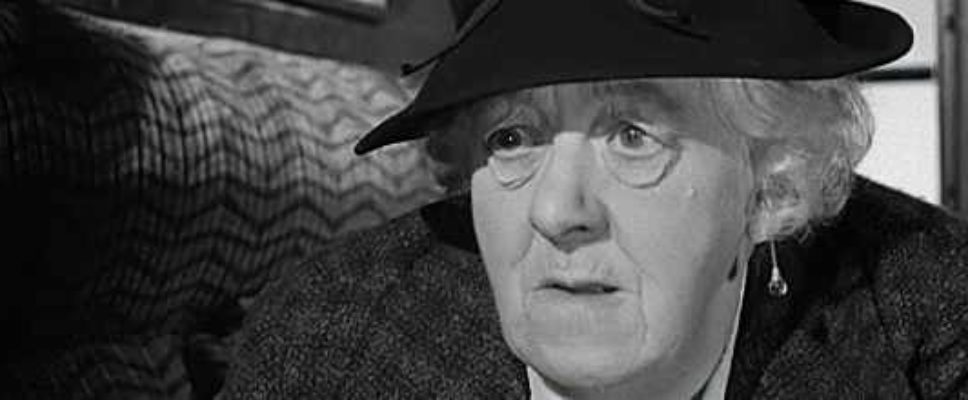Teresa Reviews: “Murder, She Said” (1961): Last Train to Whodunnit
Fidelity to text: 2 1/2 garottes
![]() The film closely follows the murder plot in The 4:50 From Paddington but changes everything else. Several major characters are dispensed with, while a new one is added: Mr. Stringer, librarian/accomplice (played by Margaret Rutherford’s real-life husband).
The film closely follows the murder plot in The 4:50 From Paddington but changes everything else. Several major characters are dispensed with, while a new one is added: Mr. Stringer, librarian/accomplice (played by Margaret Rutherford’s real-life husband).
Quality of movie on its own: 4 garottes
![]() If you can overlook how the scriptwriter played fast and loose with Agatha’s characterization of Miss Marple, you’ll love this film. It’s fast-paced and funny, has real moments of suspense, and you get to see two Miss Marples at once!
If you can overlook how the scriptwriter played fast and loose with Agatha’s characterization of Miss Marple, you’ll love this film. It’s fast-paced and funny, has real moments of suspense, and you get to see two Miss Marples at once!


At that point, the film diverges from the source material. The formidable old lady is not Elspeth McGillicuddy. It’s Miss Marple herself who witnesses the crime. Since Miss Marple is doing the sleuthing, there’s no need for the novel’s other important characters. Lucy Eyelesbarrow disappears, because Miss Marple puts on cap, apron, and uniform and gets hired at Ackenthorpe Hall as the new maid. Make sure you listen closely to Miss Marple’s conversation with the clerk at the servant’s employment agency. The clerk thinks — at first — that Miss Marple is looking for a maid for her household. Once he discovers differently, his entire tune changes. The scene is a witty parody of how desperate the upper class was to hire someone, anyone, and what they were willing to pay.

Mr. Ackenthorpe’s daughter Emma is present, along with her three brothers: Albert, Harold, and Cedric. They remain true to form and two of the three are murdered. Albert dies of poisoning (as in the book and the other adaptations) whereas Harold dies of a supposed suicide by shotgun (ala the Joan Hickson adaptation; it was poison in the novel). Cedric, louche painter, survives. So does Brian Eastley, Alexander’s father. Cedric gets more to do than Brian Eastley does. Dr. Quimper is also present and he wants to marry Emma.
Two servants are present: Hillman the gardener and Mrs. Kidder, the char from the village. Hillman gets a major rewrite, turning him into a more sinister figure. Mr. Ackenthorpe relies on him for both obvious reasons, but also nefarious, implied reasons. Those reasons are never clarified, an omission that the scriptwriter could have done something interesting with. Mrs. Kidder is played by our own Joan Hickson. It’s odd and amusing to see her facing off with Margaret Rutherford; two Miss Marples at different stages in their lives.

Finally, Miss Marple takes matters in her hands. She has the musical compact, discovered earlier, stolen and then returned by Alexander. It’s the key to the killer who recognizes its song, Frère Jacques.
 Unlike the novel or the other adaptations, this film doesn’t provide any motive or backstory for the murders, other than inheriting more of the Ackenthorpe estate. Every bit of complexity is removed, and you’re left wondering how Miss Marple is going to solve the murder. She does it and without involving fishpaste in the dining room. Instead, she has Alexander play with the compact, then takes it back to her room.
Unlike the novel or the other adaptations, this film doesn’t provide any motive or backstory for the murders, other than inheriting more of the Ackenthorpe estate. Every bit of complexity is removed, and you’re left wondering how Miss Marple is going to solve the murder. She does it and without involving fishpaste in the dining room. Instead, she has Alexander play with the compact, then takes it back to her room.
In due course, Dr. Quimper arrives and after some byplay where Miss Marple confirms his identity, he tries to murder her too. It was a great scene, full of sharp dialog and suspense.
Sadly, the movie ends shortly thereafter. Much too shortly. There wasn’t enough ending. We never see Emma again so we never see her reaction to discovering that Dr. Quimper murdered some strange woman plus two of her brothers. We’re not given a reason why Dr. Quimper murdered the woman on the train. We must assume it’s for the same reason as in the novel: his Catholic wife wouldn’t give him a divorce so he murdered her to marry Emma. The reason for the other deaths is the usual one. Emma would be a much richer woman if the Ackenthorpe estate didn’t get divvied up among the five heirs.
Even with the inadequate ending, there’s plenty to love about this adaptation. There are little shoutouts to the novel here and there. Miss Marple’s maid is named Lucy, possibly after Lucy Eyelesbarrow. Miss Marple deduces, based on the dead woman’s hands, that she’s not Martine, a Normandy peasant. It isn’t spelled out that her hands are soft and clean, well-manicured and unacquainted with scrub brushes and mops, but that’s the implication. In the novel, the condition of the dead woman’s feet, beaten up from years of ballet, helps identify her.

This is a lively, comic, well-acted and paced movie. As long as you don’t demand on a faithful adaptation of the novel or the standard interpretation of Miss Marple, you’ll have fun.


